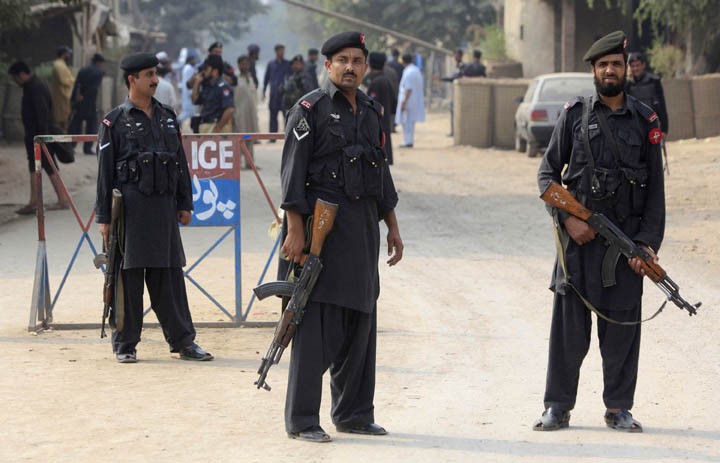
The KP Police are gearing up for replacing khasadars in tribal areas for administrative and operational control

Mainstreaming Fata is a dream for many years so that the people of this neglected part of Pakistan also get the rights equal to that of other citizens of the country. Several governments promised merger of Fata with Khyber Pakhtunkhwa, others vowed to give it the status of a separate province. Many committees were formed, debates held in assemblies and 5-star hotels. Jirgas and sit-ins were organised. The dream, however, is yet to come true.
But, in the last few months there are encouraging developments. Chief Minister Khyber Pakhtunkhwa Pervez Khattak recently hinted at merger of Fata with KP on the floor of the house, before the general elections. High-level meetings, recently held, discussed the process of merger, extension of the jurisdiction of the apex courts to Fata and the extension of Police Act to the tribal areas.
In a major development, the KP police last week nominated a senior Deputy Inspector General (DIG) of police Qazi Jamilur Rahman as its focal person for the reforms whose job is to assess the existing infrastructure and recommend all that is needed in case the police force is extended to Fata and the law and order responsibility is handed over in phases to cops.
Qazi is currently the head of Special Branch, an intelligence unit of the KP police, and apart from working in Intelligence Bureau has remained DIG of Malakand and Dera Ismail Khan Regions, two of the most sensitive divisions due to militancy and proximity to tribal areas.
"The KP Police is ready to work in Fata if given administrative and operational independence. We can start with training the existing levies and khasadars. With the support of army, we can train the entire khasadar and levies force within six months," the Inspector General of Police Khyber Pakhtunkhwa, Salahuddin Khan Mehsud, tells The News on Sunday.
According to the police chief the next phase will be developing infrastructure: building police stations, posts, weapons and patrolling vehicles. "Once we are asked to perform duties in the Agencies under reforms, we can give results within a year or two with significant improvement in the law and order situation. The Counter Terrorism Department can play a pivotal role along with police in maintaining peace there," says Salahuddin Mehsud.
A former KP Police chief, Nasir Khan Durrani, time and again wrote letters to the concerned authorities for reforming the administrative and policing systems in Fata, installation of effective border management system and recruitment of tribesmen in KP police. The official had issued a written order to all officers not to use the word ‘Ilaqa Ghair’ for tribal areas as it gives the tribesmen a feeling of being ignored and considered someone not from amongst them.
There are currently many options in case the Police Act is extended to the tribal areas in the first phase of reforms. Senior cops can head the police force in agencies as district police officers (DPOs) and the DIGs of Dera Ismail Khan, Bannu, Kohat, Mardan, Malakand and Peshawar can be tasked to supervise the affairs of their adjacent districts. The Special Branch, CTD, Frontier Reserved Police, Elite Force and traffic police can develop a setup like that in other districts and can be centrally supervised from the central police office.
"There can be a new post of additional inspector general of police Fata for speedy development of a proper policing system in the agencies, Frontier Regions (FRs) and Malakand to bring the force in these areas at par with that of other districts. The project coordination unit that supervises the construction work all over the province can develop police infrastructure in Fata at a faster pace," Qaisar Khan, a Peshawar-based journalist, tells TNS. He continues that not only the agencies but all FRs and Malakand district must have a single administrative system that is not different from the one already implemented in settled areas.
Many tribesmen who are scared of the police system in settled areas are not very interested in cops replacing khasadars. "We only want the black laws of Frontier Crimes Regulations to be abolished. The rest of the system needs small changes. It will take much time for our people to accept police in place of khasadars in tribal areas," says Saqib Orakzai, a student from tribal area. He opines that even if the Police Act is extended to the tribal areas, "the government should work hard to reform it before implementing in Fata after its merger with the KP or before it."
Almost all the stakeholders have agreed that there should be one system of administration and policing in all the settled and tribal areas instead of separate systems for Fata, Pata and Khyber Pakhtunkhwa. For the purpose, work has kicked off at different levels to assess the existing laws, manpower and establishments in tribal areas and the requirements for introducing a new system.
Currently, there is no police and judicial system not only in tribal areas but also in the semi-tribal areas of the province. The political agents (and their deputies) are simultaneously the heads of administration, judiciary and police in their own areas. Not only in the seven tribal agencies, but there are different administrative systems in six Frontier Regions and even Malakand, one of the 25 districts of KP.
There is no police force in these areas. Untrained khasadars and levies are policing these areas and are short of manpower, weapons and establishments. The army deployed here for the last many years to uproot terrorism and help the local admin restore peace, is responsible for maintaining law and order.
There are no proper police stations, posts, communication system and latest technology. The concerned political agent heads the khasadar, levies in Fata and Frontier Regions while the deputy commissioner heads the force in Malakand district.